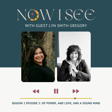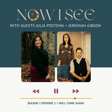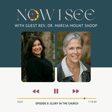Become a Creator today!Start creating today - Share your story with the world!
Start for free
00:00:00
00:00:01

The Attire of An Harlot: Dress Codes, Dating, and Sexuality in a Fundamentalist Life with Beth Kellerhals
For many who leave strict fundamentalist circles, dating and sexuality are challenging to navigate. Most fundamentalist churches teach turning off your innate sexuality as a human being and enforce excessively strict dress codes and dating policies.
What damage can that do? And how does it feel looking back at some of these enforcements.
In this episode, I’m talking with former fundamentalist and Bob Jones University graduate, Beth Kellerhals. Together, we have discuss the impact these teachings can have and how Beth is learning to move past them.
Resources
- Shameless by Nadia Bolz-Weber
- Pure by Linda Kay Klein
- Beth Kellerhals @ PechaKucha Asheville
- Amber White @ PechaKucha Asheville
Links
Transcript
Welcome and Introduction
00:00:01
Speaker
I was lost in utter darkness I was trapped in toxic shame I was bound by my religion Till I chose to break away
00:00:24
Speaker
Now I'm finding my true colors For the first time I feel free Now I'm learning self compassion And as I heal I'm finding peace
00:00:51
Speaker
Welcome to Now I See, eye-opening stories from the formerly faithful. I'm your host, Amber White, and here, me and my guests share our experiences in loving and leaving rigid faith systems. Together, we shine a light on the dark corners of these institutions and share the joys of rebuilding life on our own terms. I promise you'll leave inspired, even if you are a little teary-eyed.
Meet Beth Kellerholz
00:01:23
Speaker
Hi, and welcome back to Now I See. I'm your host, Amber White, and today I'm introducing you to my dear friend, Beth Kellerholz. Beth is a phenomenal baker and storyteller, and as you'll hear later on, we met through a pachakacha event where we were both speakers. If you're not familiar with those, which is pretty common, it's kind of like a TED Talk with images and a time limit.
Purity Culture and Body Shame
00:01:52
Speaker
I've linked both of our talks in the show notes if you'd like to listen.
00:01:57
Speaker
I was so happy when Beth told me she wanted to talk about purity culture, body shame, and dating. This is a huge issue for so many of us who grew up in fundamentalism. And it starts so young. I remember being as young as 10 and not being allowed to wear spaghetti straps because they were immodest and I had to be careful not to tempt men with my gratuitous shoulders.
00:02:24
Speaker
My church had strict dress codes for women that I'm pretty sure I crushed when I showed up to choir practice with a nose ring. I really miss that piece of jewelry so much. And Bible College had a stricter dress code than that and required women to go through dress checks, which you'll hear about later in this episode.
00:02:43
Speaker
I sat through countless hours of sermons on how important it was that I not, quote-unquote, defraud my brothers in Christ and cause them to stumble with any part of my appearance. In one sermon, young women from my church and I were told to watch out for how our perfume might even be capable of creating lust in men unintentionally.
00:03:10
Speaker
And that's the part that gets me. It's almost always the women's fault. At what point do men become responsible for their own thoughts and actions in this system? Was it my fault that the man running the car shop I took my car to for repairs in my twenties trapped me inside the car and tried to kiss me? I was wearing work attire. I made no advances or hints that I had any interest.
00:03:36
Speaker
Maybe my perfume was too strong, though, and he just couldn't help himself. I've heard countless stories of women who were taken advantage of and abused, who shouldered shame for it, when it wasn't even their shame to bear.
Critique of Religious Dominance
00:03:50
Speaker
I sometimes wonder if the men who hear these things bear the shame of feeling like they are responsible for ruining women's purity by thinking about them, or touching them, or kissing them before they say, I do at the altar.
00:04:03
Speaker
The real shame is that so many churches and religious institutions miss the opportunity to talk about sexuality in terms of dignity. They focus on upholding a dominant and submissive structure over a communicative and egalitarian one in which both people feel good and empowered and free.
00:04:25
Speaker
In her book Shameless, A Sexual Reformation, one of my favorite ministers, Nadia Bolz-Weber, says something I'm pretty fond of. She says, if those who came before us looked to Genesis to find a justification for domination, we can look to Genesis to find a justification for its opposite, dignity. Genesis says, God created humankind in God's image.
00:04:52
Speaker
In the image of God created He them, male and female created He them. All human beings are made in the male and female, not male or female image and likeness of God. And God went so far as to have a human body and walk among us as Jesus.
00:05:14
Speaker
I believe this is what allows us all to absolutely reject domination and insist on its opposite, dignity. Being bearers of God's image allows us to insist on the self-determination of our bodies and our pleasure and our hearts, and it compels us to insist on the self-determination of the same for others. It allows us to call out and reject harassment, assault, the sexualization of children,
00:05:43
Speaker
and every other thing that compromises the inherent dignity of human bodies. Dignity, the quality or state of being worthy, comes from our origin, not from our efforts.
00:05:57
Speaker
Many of us learned from church that we become worthy through being pretty and having a quiet spirit if we are a girl, or being confident and a strong leader if we are a boy. We tried to mold our behavior and our weight and our hairstyles and our facial expressions and our personalities into the shape we thought God wants us to have.
00:06:20
Speaker
as if we could earn what has already been given to us. Tertullian's flaccid interpretation of creation goes wrong in a very basic way. The imago dei, the image of God, cannot be harmed
00:06:35
Speaker
much less removed. What a weak view of God to suggest that the very image of God could be destroyed. I'm sorry, Tertullian, but women are not that powerful. Neither are men. And neither is the system of male domination and sexual harassment. I have to say, I agree, and I'll add
00:06:58
Speaker
What a weak view of men that a woman's dress or perfume could cause them to lose their senses and rob women of their dignity. And what a gross imbalance of power to subject women to.
00:07:12
Speaker
Before we get into the episode, there is a quick correction to a story that Beth asked me to share. In the portion about the school leader who checked her dress's collar length, he didn't just place his hand on her chest to measure, he asked her to bend over and see if he could see down her dress. I know, it's so much worse.
00:07:34
Speaker
I won't go into any more details and spoil the story more, but I would like you to know that I've linked a few books from the bookshop in the show notes that are relevant to this episode's theme. They've been really helpful to me over the years and I hope they are for you too. Alright, let's get into it.
00:08:00
Speaker
Hi, Beth. Thank you so much for being with me on the show today. I am so excited to have you. Ever since I heard a bit of your story when we're both doing the pachakacha event, I have just had so much respect and admiration for you and how cool you are and how delicious your food is. And you just have an amazing story and I just feel very honored to have you here, Beth.
00:08:24
Speaker
Oh, thank you. Thanks so much, Amber. I am so excited for this project. And right back at you, everything you said to me, I feel the same way about you. I'm so glad we connected in that way.
Beth's Upbringing and Dress Code
00:08:36
Speaker
And we were able to tell our stories on stage. And thanks so much for hosting this podcast and for inviting me. I'm just really happy and thrilled to be here. The pleasure is mine. I can assure you it's been a real gift.
00:08:52
Speaker
So for the sake of our wonderful listeners, could you set the scene for us a little bit? Tell me a little bit about how you grew up, what your religion was like, and your experience at Bob Jones University. Sure. Yeah. Just those few things. Just those couple of tiny details about your life that had no impact at all. Right. That's not why I'm here or anything. Well, you know, I feel as though
00:09:21
Speaker
As much as this is my story, it's actually my mother's story as well. Because, you know, growing up in this very fundamentalist way, and technically I think it's considered an independent fundamentalist Baptist, you know, I had no choice in the matter. And so I feel like it's very much
00:09:49
Speaker
you know, my mother's story, my parents' story, but my mom was really the driver of us getting into fundamentalism. And it was about a year before I was born. And my mother had a religious experience in the basement of our suburban Minneapolis home. Interesting.
00:10:10
Speaker
Yeah, and she felt like she heard the voice of God. Okay. You know, I kind of like to joke that I think it might have been Satan. But I think that was kind of what led her and then our family down this path of religious fundamentalism. And my mom was married really young. She came from a really tough background. Her father
00:10:37
Speaker
was, you know, um, I don't know if he was abusive, but I think he was an alcoholic. There was a lot of substance abuse, you know, in, in my family. And, um, so she, I think really viewed her spiritual awakening as kind of a chance to hit their BSAT button for herself and also for her kids. And so she had felt kind of abandoned.
00:11:07
Speaker
in that my grandmother was very soft spoken and kind of took a little, like a little bit passive, you know, as most women of that time were, you know, and the expectation. Exactly. And from what I understand, I think my grandmother had to get married. Oh, yes. So that was, yeah, you know, sometime around, it would have been around, you know, I don't know, 1942 or something.
00:11:35
Speaker
So a lot of shame already, right? In the family history. And so my grandmother was like a very lovely, sweet woman, but very passive. And she had to kind of keep this farm running and all of that. And so I think my mom felt kind of like abandoned and like no one was giving her structure. No one was really kind of like teaching her and guiding her. So then she thought, I know, I'll control my own children.
00:12:06
Speaker
It all comes out somewhere. It comes out somewhere. I will show my love through control and through making sure that my children grow up in a very controlled and guided kind of environment. And you know what? My mom was very young, as I mentioned, when she had my sister when she got married.
00:12:30
Speaker
and fundamentalism was booming then. Yeah, it really was. It was, you know, the early seventies.
00:12:40
Speaker
And I think that neighbors, you know, offered what every young mother is dreaming of, right? Like child care. You know, we'll come and pick your kids up on the bus and we'll take them for like three hours and they're going to be okay. And you know, and you get one thing done. You get one thing done. And you know, when I look back, there are so many things now, like in the review mirror,
00:13:07
Speaker
where it is just, I see the flames, right? It's just terror. You know, who would have thought it was okay for like a two-year-old to go with strangers on a school bus? Like two? My sister was about two. No. Yeah. That's so young. I know. That's wild. And I could have like some of the events are kind of fuzzy. You know, maybe my sister was three and I was one. My sister and I are three years apart.
00:13:36
Speaker
But at some point, you know, I know that like, you know, uh, fundamentalism, especially in the Midwest, which is where I grew up. They were obsessed with this Hiles Anderson philosophy of busing and kid. Oh, that's where that came from. It came from Hiles Anderson. From what I understand, it came from Hiles Anderson. Interesting.
00:13:59
Speaker
Yes. I'm only vaguely familiar with how I was ever said. That's interesting. Yeah. He kind of started it and the way that I see it are all of those fundamentalist pastors, they were all in competition with each other.
00:14:12
Speaker
for numbers. Oh, yeah. They can say that's not it, but we saw it. It is definitely true. It is definitely true, which makes sense where when the maggot church just came out, the venom from fundamentalist pastors, I had to wonder if it was truly about theology or if it was just about the numbers they were pulling in. I think there's probably a little bit of that going on. Yeah, probably. Yeah, the ego of the fundamentalist pastors just through the roof.
00:14:43
Speaker
It's wild. What? Freud would have had a heyday. Oh my goodness. That would be, I would pay to see that. I know. Yeah. Just to fund him those pastor stuff. Maybe it will be in the afterlife. Oh my gosh. See, that's an afterlife I'm gunning for. So, you know, I think when my mom started on this fundamentalist road,
00:15:10
Speaker
I don't think that she envisioned it the way it all kind of ended up, right? I think that a lot of movements, when it started, it had a pure heart. That's what I like to think. Yeah. I think that's true. Yeah. Because it's a lot of work to take something off the ground.
00:15:30
Speaker
It is, absolutely. And I think a lot of pastors, you know, graduated from Bob Jones and they spread out to small towns in the Midwest and northeast and all over. And that's where they, you know, kind of built and started these churches. I don't think that they started out saying we're going to become control freaks and dominate every aspect of these people's lives. I don't think so either.
00:15:56
Speaker
Yeah, I thought that they really thought they were just doing the Lord's work, so to speak. My parents, we moved to Illinois. We moved to a suburb called Hanover Park. Something that had been really important to my mom is she really wanted us in a Christian school.
00:16:17
Speaker
she really thought that that was going to be a way that we would kind of have this structure. Like that was like reinforced at home and you know where we were going to be kind of kept safe. So they found a Christian school and it was attached to a church.
00:16:34
Speaker
And it was a youngish pastor who was from the South. I think he grew up in Memphis. And he had an honorary doctorate from Bob Jones University. An honorary doctorate? Yes, I believe it was honorary.
00:16:49
Speaker
Um, I could go back and fact check that, but, um, you know, and that's the other thing too. You know, some of these fundamentalist pastors that I came in contact with over the course of my whole life.
Educational Environment Comparisons
00:16:59
Speaker
So I feel like I can, I can speak to this. Yeah. You know, you do kind of wonder like, how did they get any kind of advanced degree? Yeah.
00:17:08
Speaker
just a very different academic system is how they got an advanced degree. Yeah, it's interesting to me because I remember sitting down with a friend of mine several years ago who graduated from options and I graduated from UNC Asheville and we have one other friend who graduated from
00:17:27
Speaker
a light Christian college, but they still very much did traditional education. And we were also talking about the courses and the classes as we were about to graduate. And she was overwhelmed. She was like, I've never learned anything like this. What do you mean research? What do you mean this kind of thing? And it was really surprising to her. She had a moment where she was like, well, I don't have an education like this at all. And it is very different.
00:17:51
Speaker
I think about the education I got at Pensacola versus UNC. They put you on a track and it's a plan. There's not a lot of freedom to it. Like when I got to UNC Asheville, I was like, oh, you mean I can choose the topic of this and kind of go and make it within these guidelines? Whereas at Pensacola, it was very much reading things this way and you do it exactly this way. And it's a very different way of learning. Yes, yes. It's a very rote.
00:18:17
Speaker
way of learning because they are discouraging you from freedom. They don't want the students, they don't trust the students, they don't want the students, I don't know what it is, but they don't trust that you're going to be able to come to the same conclusions. Right. To control the outcome by controlling the process. Exactly.
00:18:44
Speaker
I was an English major and everything that we had to read was, Hemingway was considered this depraved.
00:18:57
Speaker
alcoholic who wrote these short sentences, but like we had to read it because it's like, I think Hemingway was like as dirty as they wanted to go kind of, you know? Okay. Hemingway is the limit. Yeah, Hemingway is the limit. That's interesting. That should be a bumper sticker. It's the limit. That's my new favorite. I'm making that. I'm selling it. It'll be on the website. Yes, I love it.
00:19:26
Speaker
So my back to Illinois, you know, as time went on, this pastor, Dr. Frank Bumpus, who has long since passed away, he kind of started becoming more and more strict with the rules because the school started to grow and they had a daycare
00:19:50
Speaker
And they still do. It's still around. It's still around. Yeah. It's still around. Um, it's called Schomburg Christian school. And I think they, I think the daycare is called Schomburg Christian daycare or something. Um, but the daycare just completely overtook, you know, the, the building and everything. Um, and I just always thought that was kind of ironic, you know, because they really discouraged women from working.
00:20:20
Speaker
Right. And then their daycare. It's the smallest thing about them. Yeah. It's interesting. The daycare takes off because it's like they're taking care of all these, you know, neighborhood kids or where else because it's great daycare. And, you know, people often work. There's so many when you start digging the delicious ironies of fundamentalism and the world. I mean, it's like every day is a cream bump.
00:20:45
Speaker
You just unpack it, it's like every day is a new thing. It's like, oh, here's a chocolate, here's a cream puff, because it's so delicious, you know? This like, women can't work. But we have a daycare, and it's like running our entire, it's paying for everything. It's paying for like our school and new buildings, and it's just growing and growing. It just seems like growing. I do too, it's interesting. I also love that you make baking and out, too. It's beautiful. It's so on brand. Oh, okay, glad you liked it. I love it. So you go to the school all the way through high school,
00:21:15
Speaker
all the way through high school. How many people did you graduate with? I think we had 30. So very small. Very small. And we had to wear my entire life, because I moved from Wisconsin. So I went from Waukesha Christian Academy to Shromberg Christian School. I was in first grade. I think I came in kind of like halfway. It was winter. But from first grade until my senior year, we had to wear skirts every day. Yeah.
00:21:45
Speaker
And the dress code was so strict that we had to kneel. We were wearing skirts that they were questioned. We had to kneel. And the hem of the skirt had to touch the floor.
00:22:02
Speaker
Okay. So already talk about body shame. Yeah. When you're a young person, it's already, my body is shameful. I have to make sure that it's covered. And then I have to kneel, which is a very humiliated stance. It is. It is. Right. That's like you're in a humble position. And it's not before God, it's before the teachers. Exactly. And sometimes even male teachers. Oh, of
00:22:32
Speaker
force. Zero surprise there. Zero surprise. So it was, we had, at Trauma Christian School, because we didn't have prom, no dancing was allowed. And all I ever wanted was to go to a dance. I just, one of these days I need to throw myself a prom.
00:22:53
Speaker
We should throw a Now I See podcast from. We should. For all of us. We should. I will make the cake. I will help with decorations. We'll be there with all our glow-ups. Yes.
00:23:04
Speaker
We will just dance to whatever music we want. And wear the sexiest clothes. Absolutely. Right. So we, if you went to prom and they found out there was a chance that you would get kicked out of high school. It was very strict. Yeah. And I was so sheltered that I didn't have a lot of friends outside of high school. So like the chances of going to prom were, you know,
00:23:35
Speaker
But we had all these banquets and we had a senior banquet and I was shopping in a fabric store one day.
00:23:44
Speaker
And I saw this beautiful like white kind of silky fabric that was like on super discount, but it was like that really beautiful kind of like 1950s thick, you know, kind of just a tiny bit of a sheen, like beautiful satin. And so I bought it and I thought, okay, I'm going to go have someone make me this dress that I can wear to like the senior banquet. Yeah.
00:24:10
Speaker
So, you know, by this time, it's like, it's, I don't know, probably 1988 or 89. And, you know, Princess Diana was all the rage, right? Her wedding dress. And so that was like very, a very classic pattern to have this kind of slight boat neck with a tiny bow, you know, and long sleeves.
00:24:29
Speaker
So I found that pattern and it wasn't her wedding dress pattern or anything. It was just kind of like that idea of it a little bit. And I brought it to the person who was making the dress and I said, okay, now this is a slight boat neck, but we have to make sure from my collarbone it can only measure three fingers.
00:24:52
Speaker
The three finger rule. The three finger rule. Oh my gosh. That was still a thing. Well, obviously it depends on 2008. Yeah, I wonder if it is still a thing. Probably. I don't know that that one's ever going to work. I don't think so. I mean, because it's like your fourth finger and you're on a cleavage, I don't even know. Why? Right. So the whole time she's making this dress and we're measuring it,
00:25:19
Speaker
It's right at three fingers. We're so good. But it's like, it has an appearance of it being slightly open, right? So I get the dress, we have to get our dresses checked before we can wear them. Again, it's this, we need to analyze your body. We need to analyze what you're wearing because if it's not right,
00:25:44
Speaker
you're going to cause somebody else to stumble. Yes. It's interesting to me. It's shame, right? They're invoking all the shame, but they're also making you responsible for someone else's actions and someone else's choices. It's amazing to me. It's funny to me that there are women
00:26:04
Speaker
weaker or they don't have, you know, that sort of thing. They're not capable of all of these things, but somehow they hold all the power in the world to make them stumble. It's fascinating to me. It's a real, it's one of those delicious ironies, I think. And somehow I can wear the slightly boat-necked dress and ruin a man's life, but I shouldn't go to work because I'm too emotional. I'm supposed to be at the house. It's strange to me.
00:26:32
Speaker
So strange. And I remember even like the pastor or someone saying about culottes.
00:26:43
Speaker
It sounds like what it is. It does. It's just like, just think, not nice people wear cool lots, you know, it's just like, oh, that word is so harsh. But I mean, I think our pastor said once, if anyone's attracted to a woman wearing cool lots, then there's like something wrong with them.
00:27:07
Speaker
You know, that was the whole idea. But like, again, it's all about the body because it's like you can be the most beautiful person
Dating Culture and Control
00:27:15
Speaker
and just like shining so brightly and so cool with who you are. Like that could attract someone and you could be wearing coolant, right? It's not just about your body and what you're wearing, you know, and it's such a shallow way to look at things. Again, that's the irony. Fundamentalism, like we're so deep, we're so spiritual, but yet we're only attracted to the physicality of someone.
00:27:37
Speaker
Right. That's interesting. You know, I have never heard anyone put it that way. And I really love that. And it's true. Personality doesn't come into play. No, because women are only for physical labor and physical desire. Yeah. Interesting. Objectifying, completely objectifying. So I put on this dress and I'm in the bathroom with our she was like, you know, our Christian school was so small. So
00:28:05
Speaker
a lot of the teachers kind of did double, triple duty, right? She like taught us type A and she taught us volleyball, PE. And thankfully, my best friend who still is one of my closest friends was with me and she's the one who actually remembered this story because I think I had put it out of my mind.
00:28:25
Speaker
And the school administrator, who was a man, came into the bathroom and put his fingers here to gauge the neckline. Right on your chest like that. Yes. And that was the level of we have to make sure that this dress is okay.
00:28:50
Speaker
You know, just how is that not tempting to him? It's, that's weird. So weird. So weird. And just the fact that he came into the bathroom, just the fact that he couldn't say to the female teacher, I trust your judgment. It's going to be fine. Make the decision. Right. Like I said, I had completely forgot about that and blocked that out until my friend reminded me because, you know, when I look back, um,
00:29:18
Speaker
And it's hard to say it because it's not overt, but it's like all of those things, like judging our bodies and looking at us in that way and objectifying us, it's like that is a form of abuse. It is.
00:29:34
Speaker
and sexual abuse it is and that's part of the brainwashing process too i think all these little subtle intricate ways of controlling a person add up to changing your entire way of looking at the world and your way of behaving in the world and we are interacting with men yes right and and what and what you think is normal behavior yes the fact that i grew up thinking
00:30:03
Speaker
that it was normal behavior for a man to say yay or nay to what I chose to put on my body. That is abuse. That is legit abuse. And I'm tired of not calling it what it is, right? I'm tired of saying like, well, they meant well, you know? Well, if you, when you mean well, you do well. Yeah. Or when you mean well, you're at least trying to improve.
00:30:33
Speaker
Yes. You're considering other people. Yes. And you can recognize that that is not appropriate adult behavior, adult interaction with a child. That's right. Definitely. It's interesting to me too, as recently came to my attention in doing this podcast, how many women in my church were
00:30:56
Speaker
assaulted, and they were the ones who were in the strictest families, dressing the most godly, quote unquote. When you take away women's agency,
00:31:08
Speaker
and you tell men that women are responsible for the way you behave, they then don't feel like they have to take responsibility for their actions, and they can blame it on anything but themselves. And I think what happens is, I'm not a scientist, but what I've seen, they get this really deep sense of entitlement.
00:31:31
Speaker
that somehow because they are the authority figures because they were born men and because they can't control themselves and if they see something they have to act on it. And because they're not held to a standard of, I have my own, I have control over my mind, I have control over my body and that's hurtful.
00:31:52
Speaker
they end up taking liberties. We see it all the time, not just in the church, but I think we see it often in very conservative churches. And I think that's such a big part of it. I think it starts with teaching women that you're responsible for somebody else's behavior. Because you're not. Right. Yeah, I completely agree with that. And I think, you know, if I were in that position, if I were
00:32:20
Speaker
a male in that position, you know, I would feel as though, wow, like I don't have control. Like I, like, I would feel kind of like, what's going on here? You know, somebody's telling me that I don't have agency. And I think that's kind of like the circle of circle of abuse is like, no one really has agency. And kind of everyone's doubting what, what their agency is or that they even have agency because for a man, it's like,
00:32:50
Speaker
if he's brought up and taught that he's not responsible for any of this. You're absolutely right. It's like, why, why even bother? Okay. Well, I'm just, you know, he must think that he's just a total, you know, fuck out. Yeah. Right. And I think that would also make, if it were, if I think, if I were in that position as a man, that would make me feel really stupid. Yes. Yes. That would make me feel like I was done. Yeah. I didn't have power. Like I didn't have, and you're,
00:33:19
Speaker
At the same time, I'm being taught that I'm supposed to be this amazing leader of an entire family, and my wife's not supposed to have any opinions, and I'm supposed to know everything and tell everybody what to do, but I don't have agency over my own mind. What is that? That is a disgusting irony. That is not as much of a delicious... That is a disgusting... That would taste like unflavored oatmeal.
00:33:44
Speaker
It's interesting to me and I think it's really interesting then to see young people who from the time they were, I don't know about you, but as a girl I started hearing about intensive modesty from the time I was probably five or six years old. I was very young. So then you get into puberty and you start thinking about dating and you start thinking about
00:34:07
Speaker
connection in a marriage, because they start talking about marriage to you when they're very young. And nobody knows what to do. And then there was I kissed eating goodbye, which was big when I grew up. And, you know, there's created to be his help me, which is still a really big factor. And it just gets worse as you get older. And then all of a sudden, they're like, okay, you're going to age or certain fit to your 20s. When are you getting married?
00:34:29
Speaker
Yes, it's so true. And, you know, to your point, it's also so confusing. And I think a lot of, you know, cults, fundamentalism, you know, how I grew up, I definitely see it in the in my past as a cult. And
00:34:52
Speaker
I think that cults their currency, it's confusion. They really deal in that. That really just brings home the bacon. So they create the problem that they can solve. Exactly. So true. If you just live like this, we tell you to. Exactly. You won't be confused. We have all the answers.
00:35:12
Speaker
Don't even bother being curious or questioning. Yeah, you don't need that. Don't need that. But what is so interesting to me, because I mean, talk about IKIS dating goodbye, that would probably be considered liberal about Jones. I mean, with the dating culture there, we can get into that because that's some good juicy, juicy. Please do. And I have to know.
00:35:34
Speaker
was making eye babies. Okay. When you were at Bob Jones, was it? I don't think like the making eye babies, but I think, cause I think that was more of a Pensacola thing. It was a Pensacola thing. It was a Pensacola thing. And then did you hear the jokes too? There were jokes about like, you know, the con, your contact lenses were those like the condoms, so to speak, like you couldn't think. Oh my gosh, I did not. That's the best. Yeah. Oh, for listeners who I don't,
00:36:00
Speaker
I don't know what order these episodes are coming out in yet, because I free record everything. But if I haven't told you yet what making eye babies is, at these colleges, you're not allowed to touch, you're not allowed to hold hands, you're not allowed to, you know, really date, you have to be in observed places all the time. And so, but these are like 20 something, people from 18 to 26 or so, they've got hormones, and they're all being told they're supposed to get married. And none of them have ever kissed a boy, and so they just stare at each other.
00:36:29
Speaker
deep in the eyes for uncomfortable lengths of time. It's truly embarrassing to watch. The secondhand embarrassment I used to get seeing that was so real. So true. And we called it making eye babies. I just love the content. That's great. That's great. And what is so crazy to me is like you are supposed to not have ideally
00:36:57
Speaker
don't have your first kiss and photo at the altar. That's the ideal situation. You have kept yourself pure. You are worthy of that white wedding dress. It doesn't matter what the guy's done. Back to what we were just talking about a second ago.
00:37:14
Speaker
But especially for the woman, there is so much pressure and expectation that you are supposed to be this perfectly modest, humble, meek. You know, they really love that meek word when it comes to women. That is literally...
00:37:30
Speaker
That is the birthday cake, right? Of this pastry analogy. That is like, yes, if you are weak, you are just winning that game. And then you're supposed to get married sometimes with zero knowledge of your body, right? Except that it's shameful and it needs to be covered and your knees and everything needs to be covered. So not only is your body somewhat of this like shameful vessel,
00:37:57
Speaker
but then you don't really know how it works. Pleasure, what's that? I just know. What's the purpose of that? Now we're taught we're supposed to provide pleasure. Yes.
00:38:08
Speaker
And then you get married and you're supposed to like know everything, how to do everything, how to be some crazy bigson tiger, you know, some crazy Christian tiger. Right. It's like you're supposed to go from a childlike innocent little girl into all of a sudden being able to be a porn star and then flip the switch back for everything else in your life. It's really absurd. Exactly.
00:38:37
Speaker
There's nothing whole in this religious environment. There's no holistic who you are as a person, who you are as a human being. And we are taught to completely ignore any gut.
00:38:55
Speaker
right? Any gut feeling your instinct is bad. It's like it's you. It's your ego. It's who you are. You need to die to self. Your heart is desperately leaking. Yes. So we're taught to deny everything in our gut, but yet we're somehow supposed to be so open to the Holy Spirit. I'm not sure. There's a missing piece there.
00:39:17
Speaker
How does that work? And in terms of listening to your gut, one of the biggest struggles I've had in my life is, especially when it comes to people, or since we're kind of on this topic of dating and sexuality, and there were times where it's like, I knew in my gut that there was a man
00:39:38
Speaker
who was creepy, right? Or a situation was wrong. But I had been taught, like, ignore that or, you know, give the pity date is what they called it. It was actually a courtesy date,
Ambitions and Sexism in Missions
00:39:49
Speaker
right? For those, again, the listeners, you can't say no. And, you know,
00:39:55
Speaker
the men, they weren't like, oh, great. She said yes, because I berated her into it. No man was like, you know, none of these men were ever happy about that. You know, they knew they just tell, you know, because that was me. I said yes. But, you know, just not being able to acknowledge or trust my gut. And I'm thankful that it never led me to like a bad situation. Oh, yeah, me too.
00:40:25
Speaker
But I think for a lot of people it did because they couldn't get out of it or they couldn't say no or like they found themselves in a really weird situation that turned really bad when they knew that it probably wasn't great. But it's like, oh, well, we know his parents and he's a great guy or like go to Paris mountain with him and have a picnic, no problem. Like what else do you have going on? You could never have as a woman in front of mentalism
00:40:52
Speaker
You could never have your own space and just your own autonomy on your body or even your mind or what you wanted. Everything was, you just, that wasn't allowed. You comply and you take with offer to a new saying yes.
00:41:11
Speaker
Yes, it's wild. And I remember telling my therapist once that it was it's weird to me to look back because it took me so long to learn that I had choices.
00:41:24
Speaker
I feel like when I left and started trying to live in the world, I was still very much in that space of, oh, will you say yes? And it took me so long to unlearn that and to realize that I could say, I like this, I don't like this. It took years and years and years for me to stand up for myself. It's a painful process. It's so painful. I remember a woman looking at me once and she was being like, oh, well, you made those choices. And I was like, it hit me like a ton of bricks.
00:41:52
Speaker
I had choices. Like, it shocked me to even think, like, oh, that's a total mindset shift for me. It is because the other thing about fundamentalism is you could always say, like, God told me. Exactly. The good old God told me. The good old blame it on God. Yep. I remember when I left Pensacola getting a call.
00:42:14
Speaker
and from the admissions office. We received your letter that you're going to be leaving and we just wanted to call and make sure because a lot of people leave and then realize that God is calling them back to come in. Are you sure this is the decision that God holds you to make?
00:42:31
Speaker
And I remember being on the other side of that phone and just the rage that was inside of me. They would dare to call me after I made it explicitly clear in my letter that I would not be returning and that I was not happy with the way they were running the show. To call me and then be like, well, God might tell you differently. Like, you're trying to manipulate me. And when I could see it for what it was, it made me so angry, so angry. But they do that. They use God for their own
00:43:00
Speaker
desires. They want you to come there and they want you to put your money into them. Yeah, absolutely. Because that's, you know, that was another thing when I was in at my high school, and I really did want to serve God. And I really wanted to go overseas as a missionary. That's another great story. But, you know, the youth pastor of
00:43:25
Speaker
The church where I went and school said, like, if you're going to follow God and go be a missionary, you have to either go to Bob Jones or Pensacola. That's, that's it. Those were the only two places. And as I was finishing up my senior year of Bob Jones, and at this point I, I had dated quite a bit, but I knew, I knew that I wanted to go and be a missionary for her.
Racism in Fundamentalist Institutions
00:43:50
Speaker
a year or time period. And I knew that I was probably going to be single doing that. And I went, they had this mission conference and I went and it was like an African mission board. I don't remember the name now. I remember telling the man who was representing that mission board that I wanted to go overseas, go to Africa.
00:44:16
Speaker
And yeah, it's always gotta be some embedded racism in there. I think so too. I don't say that with any surprise. I definitely think that's what it is. I think so too. That's a whole nother conversation because it's like, you're going to be the most of the savior. If you go to Africa, that's the racism. I think that's there. I think so too. Like that's like the ends of the earth. Lowest of the low that you could go, which is devastating.
00:44:40
Speaker
truly incredible. And it's a continent. It's not even one place. It's a bunch of places. Did you at least get it right and say like a country and not just like the whole continent? Yeah. Just like we're so full of ourselves and it's like nobody's ever like, Oh, North America. No, they're like America. Right. And do you think we would do that back to Africa? No, of course not.
00:45:06
Speaker
Um, so this man once again looked me up and down and he said to me, are you married? And I said, no. And he said,
00:45:19
Speaker
Okay. Um, do you have a fiance? Cause that's just as good as Mary, you know, Mary and Joseph, that whole story, you just gotta be working for that ring, you know? Um, so that would have been okay. I think if I had a fiance and I said, no.
00:45:40
Speaker
And he said, well, are you dating anybody? You know, like the desperation in this man's face, you know? And I said, no, I'm not. And he said, well, he said, you can't go single. He said, you're too cute. And you're too pretty. I mean, that's true. But like,
00:45:59
Speaker
not appropriate for him to say. Exactly and I mean to this day I think about this and I'm still just like I you know on what planet are you know I just can't even believe it sometimes and by this time at Bob Jones I lived off campus. I lived with my sister. I worked in a restaurant and the restaurant was owned by a gay man and there were a lot of
00:46:27
Speaker
gay identified people that were kind of like feeling more comfortable to come out at that point in time. So my world was expanding a little bit, just a tiny bit. Just a tiny bit, just enough to know, like, you know, I hadn't like left my faith or obviously I was like trying to go overseas to be a fundamentalist missionary, but I had at least been exposed a little bit and had come in contact with people that I really liked. And I loved working at this restaurant.
00:46:55
Speaker
for, you know, if we have any listeners who remember old time Greenville, it was called Annie's and it was kind of like this natural kind of cafe.
00:47:03
Speaker
And they had this great salad. They put sprouts on it. That was groundbreaking for that time. That was a big deal then. Yeah, a big deal then. Sprouts were exotic. Avocados was being built back in the day. Oh my gosh. And so I knew enough to where I just couldn't believe that this man was saying this to me. And he said, so many single missionaries go to Africa. And they end up falling in love with one of the natives because they're so lonely. Oh.
00:47:33
Speaker
racism. It was just like the racism and the sexism. It's like, I needed a bucket to like, just, you know, put near this man to like, take all this like, everything that was coming off of him, racism, sexism, everything, you know, just everything, like, and the way in which he would like, use that kind of language, like, I instinctively knew at that point in my life,
00:47:58
Speaker
that it was just so glaringly wrong and this was so not anything I wanted to be part of. And I actually wrote a letter. I wrote a letter to the administration about that exchange and to their credit, they wrote back and they said that they were sorry that that had happened and that they were going to speak to that man. I'm surprised, but that's great. I know, right? Yeah, they shut down all the grace inquiries and all of that into Bob Jones and all of their sexual scandals, but they did that one thing for me.
00:48:30
Speaker
A lot of things. At the time you were going, they had tons of strict dating rules. Was it still very much a faux pas to see interracial couples when you were there? Yes. It was still something that you could get kicked out for. Really? Yeah. You could get kicked out for dating outside of your race. Wow. Which again, the whole, the part of me that just wants to
00:48:59
Speaker
kind of poke fun is like, so I'm German. So like, how does that work, right? Do we have, you know, but of course it truly is about the color of someone's skin. You can say it's not too blue in the face, but come on. Yeah, because it's all about the optics. That's the other thing with fundamentalism, the optics and the optics of we always look a certain way.
00:49:24
Speaker
And I'll be blunt about that. Oh, absolutely. They will say to you, we want you to be able to leave this campus and anyone see you and know where you come from. Oh, absolutely. It's wild. Absolutely. Yes. It's like a branding. It is. It's like the branding.
Leaving Fundamentalism
00:49:41
Speaker
Absolutely. And so that was also part of it. You know, that you couldn't date outside of your race. And of course, just
00:49:51
Speaker
there could be no touching, no interaction like you had to. It was just purity culture on steroids is the only way that I can describe it of, you know, any kind of touch is wrong between and lustful. That's the other thing that's really hard to swallow is as we move through the world as human beings and we recognize that like touch isn't always arithmetic.
00:50:18
Speaker
No. You know, hello for the mentalist. Sometimes it's just normal people. Exactly. Sometimes it's like reaffirming and it's a touchstone. It's like all these things that make us human felt as though the humiliation of fundamentalism is taking away a person's humanity. They're like, I cannot have human desires.
00:50:46
Speaker
And for a long time, like I didn't date because I was afraid of opening that pink horse box of sex. Right. Because sex and sexuality, that is like the ultimate, you know, Dante circle of hell. I mean, you are in fundamentalism. Absolutely. Yes. That is the ultimate. You're on the bottom.
00:51:09
Speaker
Well, think about all the demonstrations that used to do about that, with the rose passing it around the room and it being touched, and then all of a sudden it's not beautiful anymore. And the chewing gum, do you ever see the chewing gum one? That has to be the worst.
00:51:29
Speaker
a less crass version of that, right? It's like, why buy the milk when you can get the cow for free? Again, that is actually pretty crass. It is, very crass. It's the same kind of crass. Yeah, the fact that a woman would be a heifer, right? I mean, just right there too, just so many things. For any object at all, this woman is a piece of chewed bubblegum. That is a really terrible thing to say about God's creation, don't you think?
00:51:57
Speaker
Absolutely. Absolutely. And no one ever says that about like the men. No, like, oh, he's lived in high school. He just had sex with like a couple of girls, but then he felt terrible. Yeah, it's much better.
00:52:07
Speaker
He went to a ranch in Texas for a week. Now he's learned his lesson. He reclaimed his virginity. No. That's the thing. It's like virginity is a social construct, but even for men, it was never a thing. In fundamentalism, men don't have to worry about their virginity because there's nothing shameful
00:52:33
Speaker
about them having an accident. Yeah. I mean, they might be told it was wrong, but they will not be publicly shamed for it. Yeah. It will be covered up. It will not be discussed and it's fun. Yeah, absolutely. Yeah. It's interesting. But then, you know, if you're a woman,
00:52:50
Speaker
all of a sudden, you're the church's love. And I've seen it happen. I saw it happen to several of my own friends growing up. It's the things that were even always inside their control. Yeah. But then, you know, all of a sudden they're going to have these horrible, you know, disgraces. Yeah. And I just, I've never been able to reckon the idea that God feels that way about them.
00:53:16
Speaker
and is ultimately loving. I just can't, those two ideas that have been diagrammed has not overlapped. Those are two very separate gods you're talking about, I think. Yeah, it's very true. And you know, when we look at the life of Jesus, his interactions with women, but especially women who were considered to have done something shameful in the culture,
00:53:45
Speaker
were just so different from how we see interactions of fundamentalist men in power today. And what I can't wrap my head around is Jesus was pretty much tearing down the patriarchy, right? I mean, it was just every woman that he came in contact with. And in that culture, there were sanitary issues, you know, every culture has them.
00:54:15
Speaker
to think like he, it's not recorded in scripture that he was like, it'll gross get away. I'm clean. You have your period or, you know, the woman who had the issue with blood, right? We don't know if it was her period, right? We assume or something, you know, some kind of issue, right? But when you see his interactions and his compassion for their humanity,
00:54:37
Speaker
And for like the way in which their bodies were not shameful, they were just being bodies. It's completely separate from who they were as a human being and who their soul is and how he loved them and interacted with them. It's just so different than what you learn in the blood of the house church.
00:54:59
Speaker
Yeah. And it's so sad because there's this part of me that loves that Jesus. Oh, absolutely. And that's the Jesus that I want to follow, that I want in my life. That's what I want to be. Exactly. Exactly. That the Jesus that I want to be, that's the brand of Christianity. And that's the God that I want to be a part of.
00:55:28
Speaker
That's light in the world. Light in the world, seeing people meeting them where they're at. And I think it's so sad that the church has kind of gotten to where it is today. I think, you know, I kind of was like, I would love to ask a fundamentalist pastor one day, like, how do you reconcile how Jesus walked the earth with the rules and regulations
00:55:58
Speaker
that are meant to be followed in these churches and just the shame tactics that come when they don't. The shame of my dress not passing. The shame that something's wrong. The shame if you're sleeping with your boyfriend or girlfriend or whatever that looks like. The shame that is meant to
00:56:26
Speaker
put you in your place to do what you're supposed to do. The shame of getting divorced. Oh, yes. It's it's big. Yeah. I would be interested to hear how that reconciliation happens. I think what I've heard a lot growing up is
00:56:46
Speaker
You can't take the stuff, the good stuff that you love and leave out the others. You know what I mean? And it always comes back to that, but there's new explanation of how you can justify that theology with theology that just doesn't exist in the Gospels with Jesus. It just doesn't. Yeah. So tell me a little bit. So you go to go up to your, your one, you experience all of this. How do you end up leaving?
00:57:10
Speaker
Well, I graduated. So I graduated and I kind of wandered around for a little bit. And I think that I always knew that I would leave like stripped fundamentalism.
00:57:33
Speaker
That really wasn't a doubt in my mind. I still really held for a long time to some of the rules and regulations. I'm definitely into dating. I was really late to having a sexual awakening and kind of blossoming that way. And that's okay. Yeah, it's so okay. I think it can get really lost.
00:57:58
Speaker
that it's okay to take your time too. There's nothing that says you have to either do or don't at any given time. Your life path is your life path. And I do think that sometimes those of us who leave the fold or leave the faith, then look at people and go, oh, you haven't done this yet? And it's like, okay, well, you know what? I get to make my own choices. That's the whole point, right? Exactly. If you want to have a moment of that. Yes. I'm so glad you said that because there are these kind of
00:58:26
Speaker
cultural markers. And then there's also like the fundamentalist markers. And then if you read fundamentalist, they're fundamentalism. There's also those markers.
Exploring New Spiritual Paths
00:58:35
Speaker
So I think, yeah, I was always kind of on my own timeline, but I did end up going to China. Permission work? Yes. So it was always under the guise of, you know, teaching English or studying Mandarin. But I had a good friend who was from the liberal Yeaten College.
00:58:53
Speaker
Not me. And in fact, there's a picture of me in the Bob Jones' yearbook. I think it's 1990, 1991, and I had a weekly t-shirt on and they had to airbrush weekly and out. So it looks like I'm just wearing, yeah, a plain t-shirt. That's hilarious. Isn't that hilarious that you had to airbrush that out? Well, it is Sodom and Gomorrah over there. It is, yeah.
00:59:17
Speaker
Um, total. Yeah. Um, and you know, you've reached a different point in your life. And of course I look back now I'm like, oh, Wheaton is so conservative. Yeah. So yeah, my friends kind of got me in touch with the school and we actually went together. She was just there for one semester and I was there for a year.
00:59:41
Speaker
And then I went back. I came back to the States and I was in the States for a while and I kind of got involved with a Korean church, which was a much more like evangelical, you know, very liberal compared to my fundamentalist upbringing. And that was like a really good time of spiritual growth for me. That was good. It was good. Like I needed that.
01:00:06
Speaker
lots of people who had come from different cities and who were in Chicago studying and that really expanded just my knowledge in general of the world and
01:00:19
Speaker
I felt very safe because I felt very safe, you know, after living in China and then kind of coming back to this like, you know, lovely, warm Korean church family. And so there was a lot of safety there. And I feel like I really grew a lot there. And so I kind of came out of fundamentalism and was more into like evangelicalism.
01:00:41
Speaker
at that point for quite a while in my life. Most people might not understand that. That's a big leap. It is a big leap. It's a huge change. It's totally different theology in some ways. It is. Very different theology. I think some of the tenants are very similar in terms of living a pure life. I mean, I Kids Dating Goodbye was definitely still very much in a rotation on the books there.
01:01:10
Speaker
Um, and getting married and having kids and having a family was, you know, high priority. Um, and so as a lot of people paired up and got married and I didn't, I did feel like I kind of aged out, you know, after, after a certain time and stuff, but it was definitely a safe place for me. It was a safe environment. Um, there, he's still there. A great pastor there who, he was really kind to me when I would kind of express some fears.
01:01:42
Speaker
And it's a Korean church and they had this mother kind of church where they shared the same building that was like all Korean speakers and then you were the English speaking congregation.
01:01:56
Speaker
You know, one of the things that they'd love to do is have these like early morning prayer meetings at like five in the morning. And we would give things up for Lent. And sometimes I would have this fear of like, I would go to the pastor and I'd be like, I can't participate and like collectively giving something up. It just reminds me too much of my fundamentalist past, you know? He was always like really kind to like listen and take that in.
01:02:21
Speaker
And I wasn't in therapy at that time in my life. But when I look back now, I see that as like the opening of the door to therapy of where it's okay. You don't have to partake. You can still be with us. This is your life. You're walking this path. And I think I really appreciate that. That's really sweet. That's not everybody's experience. I'm glad it was real.
01:02:51
Speaker
Yeah. And so, are you still involved in a faith system? Are you doing your own thing now?
01:03:00
Speaker
Um, I feel like, you know, how you see on those like Bumble profiles, like I'm, I'm spiritual about religious. Um, I definitely, I have these moments where I miss it. And, um, I have a neighbor and we connected, uh, one day because there was a lost dog in my neighborhood and I saw that she was wearing her collar.
01:03:25
Speaker
and she's an Episcopalian priest. And we just like have so hit it off. And I love hanging out with her and her husband. And I've gone to her church a few times. And one night we were talking a few months ago and she and her husband said, do you have a spiritual community here? And I said, I think it's you two. I think it's the two of them. But like, I think like my spiritual community, especially when I was living in LA, it became much more of like,
01:03:56
Speaker
Rob Bell, Peter Rollins. There are some teachers who are very, I think, kind of well known for people who are deconstructing their faith. And I definitely deconstructed that great Korean
01:04:08
Speaker
evangelical experience, I did deconstruct out of that. And living in LA, I could like go hear Rob Bell. He like speaks a lot and Peter Rollins and like other people have like really interesting takes on spirituality. And so I kind of felt there was also a community in LA where we did atheism for Lent, which is a really great
01:04:31
Speaker
It's a really great program like from Peter Rollins. And so I kind of got to know that community a little bit. And I felt in LA, those were my spiritual teachers and like my faith system was kind of the deconstructing, but not deconstructing in a way of, I hate this, I never want to go back to it. It was just like, this no longer is like where I'm at. You know, rethinking it, coming out of it and like building something new.
01:05:00
Speaker
And so I'm not really part of a faith system. I think I am definitely more of still that like Bernie Brown, Richard Rohr, Ross Bell. Those are, you know, Richard Rohr so much, you know, I feel as though I get the daily emails from him that his center sends out. And, you know, I just like his perspective.
01:05:26
Speaker
And just as falling upwards, you know, I think those are kind of like the spiritual platitudes that I aspire to. And so maybe one day I'll go back to something that's very tactile and where I'm there and, you know, in a community. But for right now, it's been more interpersonal relationships.
01:05:50
Speaker
There is a lot of spirituality in the personal relationships and I love that. Yeah, it's great. This has been a phenomenal conversation. Oh, thanks. It's been great.
Challenges and Joys of Independence
01:06:01
Speaker
I have enjoyed this so much. Me too. I wish people could see our faces. I know. It's so amazing to connect with someone who understands
01:06:10
Speaker
what you went through, right? How great it is to be where you are now and being able to say these things out loud. Because I don't know about you, but for a very big portion of my journey, I couldn't say them out loud. They were just inside doing a tornado situation. It was not great.
01:06:28
Speaker
Yeah, and I mean, I know that even I've had people say, you know, Beth has lost it, you know, Beth Beth has learned to left her faith. She's lost it, you know, and Yeah, or like, you know, and and a huge something that was kind of defining for me to even
01:06:52
Speaker
start to deconstruct was I started dating someone who's of a different date. Oh, that'll do it. Yeah. And so immediately right there, it's like, I mean, the chopping block just comes out quick, quick. It is like, what is in your heart? It's evil. Um, and so, but you know, I'm so glad that I saw that. That was such a tell. There was such a tell that like,
01:07:20
Speaker
You can't love me through my happiness. That's a problem. That's a huge problem. Not my people. People I thought were my people for like 25, you know, long term years. Like the thought, you know, back to that, like the thought, I mean, just people's thought
01:07:41
Speaker
that I was losing my virginity. It was just, I mean, first of all, none of their business. Second of all, it's a social construct. All these things. Why do you care? Why is it such a big deal? Again, it's like that Dante's, if you supposedly commit some kind of sexual sin, you're on a whole nother level. Anyway, that's all another conversation, but yeah. It's amazing how big our stories are. We could go on forever. We could go on forever.
01:08:10
Speaker
But unfortunately, we have reached the port. Well, fortunately and unfortunately, reach the portion of the show where I get to ask my guests. Yes. My favorite two questions. Yes. So in closing, I have two questions for you. And the first one is, what is something that you see clearly now that you didn't see before when you were the most entrenched in your journey? I think what I see clearly now is
01:08:40
Speaker
I see human being. Even with all of the divisions that we find ourselves in, when I stop to really look at people and I see them as human beings and I think, what's their story? What's that story behind it?
01:09:08
Speaker
And when I can just see people as kind of how they show up and just as a human being and not as someone who, you know, human beings are like, they're not deserving of my judgment, you know, that's a waste of my time. It's a waste of every, you know, when I just see them, how they are in the world and I think what's their story and I don't have to, you know, see things through this,
01:09:37
Speaker
kind of labeling because that's so much a part of fundamentalism as you know labeling but when I can just see a human it's like oh yeah it's amazing we're together on this thing we're doing it yeah we're in it it's like a whole different world it's a whole new one yeah it's very Disney and so our last question yeah
01:10:03
Speaker
is what have been some of your greatest moments of joy in rebuilding your life after leaving Plymouthism? I had a really big one when I decided to move from Los Angeles to Asheville. And that was the first time where I didn't even think, oh, I wonder if this is God's will.
01:10:29
Speaker
Really? Yeah. Even after like deconstructing and not being religious, you know, at all, I think I still kind of had a little bit of, I think it still like stays with you forever. This like residual kind of like,
01:10:44
Speaker
I don't know, feeling of like luck or something, right? It's that rabbit's foot, so to speak. But you still have to consult the oracle. But I made that decision so logically of, okay, this is what I think I need to be doing with my life right now. And here are all the reasons why it makes sense. And I think this is a really good decision.
01:11:10
Speaker
might not be, but you know what, I'll be okay. I can adjust. And I remember telling a friend of mine who grew up this way too in LA, I kind of told her about that. And it just, every time I think about it, it brings me so much joy because it's turned out to be a great decision. I can honestly say it hasn't been easy.
01:11:32
Speaker
But, and I've missed LA at times, of course, but I haven't regretted that decision. And I look back and think about the freedom that I felt.
01:11:43
Speaker
That is joy. Like not having this weight of having to, uh, you know, kind of defend my decision. Like, well, God told me, so I'm packing up my car and moving to Asheville. You know, it was just this beauty of this is what I'm going to do. This is a decision that I've made. It's about me. Yeah. Yeah. And I'm in the driver's seat. That's, that has been just one of just the best moments of joy.
Final Reflections on Growth
01:12:13
Speaker
And I think my other, I've been feeling it a lot lately, and it hasn't been easy, but I've been feeling like I'm moving through the world as a human person. Oh, isn't it so good to just be living and you're like, Oh, I'm not worried about
01:12:34
Speaker
they're not ruining my family's life or you know. Yeah it's just it's been it's like every day it's a free ice cream cake. No. Every day it's free ice cream it's like just this joy of like it doesn't mean that I'm not going to make mistakes it doesn't mean that I'm perfect but it just means that the hard work that I've done like it's showing up in the fact that the way in which I'm moving
01:13:02
Speaker
is like wanting to take care of humanity, but also recognizing, no, but I'm healed. So I need to do what's also best for me, but I love you. But I'm like, I just see things so differently. Oh, I just love this. This is great. And I'm so happy for you. Thanks. It feels really good. And I just want to encourage
01:13:25
Speaker
all the listeners out there, like someone told me recently, the issues are in the tissues. And it's so true. I love that. It's so true. But like, just stay with it. Because like getting on the other side of all of this, you know, like years and years, it's so worth the work. It is worth the work. It's so worth it. It's worth the temporary discomfort. It is. It is. It's better. The temporary discomfort is better.
01:13:55
Speaker
than the grossness you feel living in that. Absolutely. It really is. Well, Beth, thank you so much for your openness and your vulnerability, and for all of the delicious baking and allergies. It has been a beautiful experience being here with you today. Thank you so much. Thank you. Thank you for creating this lovely, safe space and so much for having me.
01:14:29
Speaker
Thank you for tuning into this episode and being on this journey with me. You can find resources and links in the show notes. If you're enjoying the show, please subscribe, rate, and review, and follow along on social media to help us grow.
01:14:45
Speaker
Now I See is independently funded by me. If you'd like to help support the show, you can donate directly or purchase a merch item on the website. Music for this episode was made by Alana Sabatini, a former faithful and talented musician. And finally, this podcast is made possible by the incredible team at Softer Sounds, a feminist podcast studio for entrepreneurs and creatives providing technical skill with tender support.



















